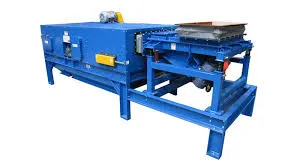

Th11 . 14, 2024 15:53 Back to list
Understanding the Price of Industrial Shredding Machines
The industrial shredding machine has become an essential tool across various industries, playing a critical role in waste management and material recycling. As the global emphasis on sustainability and efficiency grows, the demand for shredding machines continues to rise. However, understanding the price dynamics and investment considerations surrounding the purchase of these machines is vital for businesses aiming to optimize their operations.
Factors Affecting the Price of Industrial Shredding Machines
1. Type and Capacity The price of shredding machines can vary significantly based on their type and capacity. For instance, single-shaft shredders tend to be less costly compared to multi-shaft or high-capacity shredders. The capacity of the machine, defined by the volume of material it can process per hour, will also influence the price. Higher capacity machines usually come with a steeper price tag due to their robust construction and advanced technology.
2. Material Specificity Different shredders are designed for specific materials, whether it be metal, plastic, wood, or electronic waste. Machines that are versatile and can accommodate various materials may cost more than those designed for a single-purpose application. Businesses should evaluate the types of materials they handle to find a shredder that fits their needs without overspending on unnecessary features.
3. Technological Advancements As technology evolves, so do the capabilities of industrial shredders. Machines equipped with advanced features such as variable speed controls, automated feeding systems, and integrated dust suppression systems provide enhanced efficiency and safety. However, these technological advancements typically come at a higher initial investment.
4. Brand Reputation The brand and manufacturer of the shredding machine can greatly influence its price. Well-known brands with a history of reliability and superior customer service often command higher prices. While it may be tempting to opt for a less expensive, lesser-known brand, it is crucial to consider the long-term costs, including maintenance and potential downtime.

5. Customization and Additional Features Many businesses opt for customized shredding solutions that cater to their specific needs. Customization can include modifications to the shredding mechanism, additional features for safety, or enhancements for processing efficiency. These bespoke solutions can significantly increase the overall price of the machine.
Price Range of Industrial Shredding Machines
The price of industrial shredding machines can range from a few thousand dollars to several hundred thousand dollars, depending on the factors mentioned above. For instance, entry-level shredders might start at around $5,000, which are suitable for small operations or specific applications. Mid-range shredders designed for moderate production levels typically fall between $20,000 and $50,000. On the higher end of the spectrum, large-scale, high-capacity shredders designed for heavy-duty applications can exceed $100,000.
Cost-Benefit Analysis
When considering the purchase of an industrial shredding machine, businesses must conduct a cost-benefit analysis. While the initial investment may seem significant, the long-term savings from efficient waste management, recycling, and compliance with environmental regulations can justify the expense. Furthermore, a reliable shredding machine can reduce labor costs, minimize waste disposal fees, and repurpose materials that could otherwise contribute to landfill waste.
Conclusion
In conclusion, the price of industrial shredding machines varies based on numerous factors, including type, capacity, technology, and brand reputation. Businesses must carefully assess their specific needs, the materials they handle, and their budgetary constraints when selecting a suitable machine. Ultimately, investing in a high-quality industrial shredding machine can lead to substantial long-term benefits, enhancing operational efficiency and promoting environmentally responsible practices. By making informed decisions, businesses can not only improve their waste management processes but also contribute to a more sustainable future.
Latest news
Troubleshooting Common Eddy Separator Problems
NewsJul.04,2025
The Role of Metal Recycling Plants in Circular Economy
NewsJul.04,2025
The Impact of Recycling Line Pickers on Waste Management Costs
NewsJul.04,2025
Safety Features Every Metal Shredder Should Have
NewsJul.04,2025
How Industrial Shredders Improve Waste Management Systems
NewsJul.04,2025
How Cable Granulators Contribute to Sustainable Recycling
NewsJul.04,2025